1800s
1800 French zoologist Jean-Baptiste Lamarck presents the first cohesive theory of biological evolution, consisting of two forces driving the increasing complexity of organsisms and their adaptation to their environments. "Lamarckism" refers to the inheritance of physical traits based on their use or disuse.
1801-05  President Thomas Jefferson and the First Barbary War President Thomas Jefferson and the First Barbary War
1803 The U.S. makes the Louisiana Purchase of the territory claimed by the French in N. America.
1804  Lewis and Clark Expedition explores the Northwest by way of the Missouri and Columbia Rivers. Lewis and Clark Expedition explores the Northwest by way of the Missouri and Columbia Rivers.

1804  Napoleon Bonaparte crowns himself as Emperor of the French Napoleon Bonaparte crowns himself as Emperor of the French
1805 British navy under Horatio Nelson defeats French navy off of Cape Trafalgar, SW. Spain.
1807 German philosopher Georg Wilhelm Friedrich Hegel publishes The Phenomenology of Spirit, in which he first presented his dialectical method. The word "Geiste" can be translated as "Spirit" or "Mind", and Hegel wrote that it becomes knowledge in stages.
1807  England abolishes the slave trade. England abolishes the slave trade.
1808 Importation of African slaves into U.S. becomes illegal.
1808 English chemist John Dalton presents the first Atomic Theory with a method of calculating the relative atomic weights of elements. He based it on his study of gasses as a meteorologist.
|
1810s
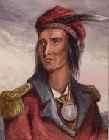
1811  Indian forces allied under Chief Tecumseh defeated in the Battle of Tippecanoe. Indian forces allied under Chief Tecumseh defeated in the Battle of Tippecanoe.
1811 Louisiana Slave Revolt on the east bank of the Mississippi River was inspired by Haitian Revolution and led by an enslaved overseer of other slaves, Charles Deslondes.
1812  The U.S. declared war on Britain The U.S. declared war on Britain
1812  In June the Grand Armée invades Russia.
In October Napoleon begins his retreat. In June the Grand Armée invades Russia.
In October Napoleon begins his retreat.
1814 Napoleon abdicates and is exiled to Elba. French diplomat Talleyrand supports the Bourbon Restoration decided by the Allies at the Congress of Vienna.
1814 to 1824 Louis XVIII is king of France
1815  Wellington defeats Napoleon at Battle of Waterloo. Wellington defeats Napoleon at Battle of Waterloo.
1817 Spain agrees to abolish its slave trade
1819 German philosopher Arthur Schopenhauer publishes The World as Will and Representation in which he, like Kant, views experience as a "representation" or "idea" of the world. Schopenhauer identifies the actual essence of things as "will". He says art can temporarily release us from the endless suffering caused by this blind force, but that true redemption only comes through asceticism.
1810s Maine de Biran was a French aristocrat who temporarily retired from politics during the French Revolution and developed three philosophical systems based on 1. sensation, 2. human will and 3. religion. After 1818, Biran advocated a mystical intuitional psychology.
|
1820s
1820 French physicist André-Marie Ampčre develops a mathematical and physical theory for the relationship between electricity and magnetism. The unit for measuring a electric current, "ampere" or "amp", is named after him. He also invented the solenoid and the electrical telegraph.
1821 Michael Faraday was the first to demonstrate the conversion of electrical energy into motion and discovered electromagnetic induction 10 years later and made the first electric generator. He also discovered new chemical compounds, but his name is now most commonly associated with the "Faraday Cage".
1821-29 Greek War of Independence from the Ottoman Empire

 Simón Bolívar liberates Venezuela and Panama in 1821, Ecuador 1822, Peru 1824, and Bolivia in 1825. Simón Bolívar liberates Venezuela and Panama in 1821, Ecuador 1822, Peru 1824, and Bolivia in 1825.
1823 Monroe Doctrine of non-interference by Europeans in Americas
1825 Erie Canal completed
1827 German physicist Georg Ohm published The Galvanic Circuit Investigated Mathematically containing his discovery that electromotive force is the product of the strength of the current, and the resistance of that part of the circuit, Ohm's Law.
1829 The first treated (sand-filtered) public water supply was installed by the Chelsea Waterworks Company in London.
|
1830s
1830 The first inter-city railway in the world, the Liverpool and Manchester Railway, opened.
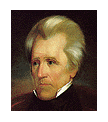
1833  Andrew Jackson vetoes new charter for the Bank of the United States. Andrew Jackson vetoes new charter for the Bank of the United States.
1833 Slavery Abolition Act frees slaves in British Colonies.
1834 French priest and political theorist Félicité de La Mennais publishes Words of a Believer a year after renouncing his religious functions. It denounced the established social order and continued his advocacy for theocratic democracy.
1835  Alexis de Toqueville publishes Democracy in America Volume One. Alexis de Toqueville publishes Democracy in America Volume One.
1835 Richard Lawrence attempts to shoot President Jackson.
1835 U.S. national debt was paid for the 1st and last time.
1836  Republic of Texas established Republic of Texas established
1837 Swiss-born American biologist and geologist Louis Agassiz proposed that the Earth had been subjected to a past ice age. He later found evidence of past glaciers in the British Isles and published Studies on Glaciers in 1840.
1837 French artist Louis_Daguerre invents the Daguerreotype photographic process.
1837-1901  Queen Victoria's reign begins. She has 9 children, who marry into various European royal families Queen Victoria's reign begins. She has 9 children, who marry into various European royal families
1839-42  First Opium War - the British seize Hong Kong First Opium War - the British seize Hong Kong
|
1840s
Electrical telegraphs begin to be used by railroads
1843 B'nai B'rith was founded as a cultural association for German Jewish immigrants to the US and evolved to serve Jewish people globally.
1844 German Max Stirner publishes The Ego and Its Own which asserts that everyone is propelled by their own egoism and desires, and that people who accept this can live freely and those who do not will falsely believe they are serving another cause while unknowingly actually serving their egos. Stirner was a friend of Friedrich Engels and influenced several postmodern movements.
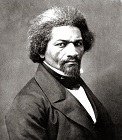
1845  Frederick Douglass publishes his 1st autobiography Frederick Douglass publishes his 1st autobiography
1845  Potato Famine begins in Ireland Potato Famine begins in Ireland
1846-48  Mexican-American War Mexican-American War
1847 The Pennsylvania assembly bans the import of slaves
1848 French philosopher of science Auguste Comte published A General View of Positivism in which he outlined 3 stages of social evolution, 1. theological. 2. metaphysical, and 3. scientific (positive). It is considered the founding text of sociology.
1848 German-born revolutionary Karl Marx cowrote The Communist Manifesto with Friedrich Engels and wrote the three-volume Das Kapital from 1867 1894. His philosophy of Marxism has exerted enormous influence on modern intellectual, economic and political history.
 European Revolutions of 1848 European Revolutions of 1848
1849  California Gold Rush California Gold Rush
|
1850s
1850-52 P. T. Barnum tours the U.S. with Swedish singer sensation Jenny_Lind.
1850–64  Taiping Rebellion in southeastern China. Taiping Rebellion in southeastern China.
1852 Napoleon III founds 2nd French Empire
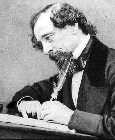
1852-59  Charles Dickens publishes Bleak House, Hard Times and A Tale of Two Cities Charles Dickens publishes Bleak House, Hard Times and A Tale of Two Cities
1854–56  Crimean War Crimean War
1854 Commodore Perry forces Japan to allow trade with U.S.
1856 2nd Opium War between several western powers and China
1856-63 Gregor Mendel's pea plant experiments established many of the principles of inheritance.
1857 French microbiologist Louis Pasteur's experiments showed that specific microorganisms were associated with fermentation of food. His Pasteurization process was achieved by killing them with oxygen or heat. This gave rise to germ theory and
his vaccinations for rabies, cholera and anthrax.
1857 British Raj replaces Mughal rule after Indian Rebellion against the rule of the British East India Company,
1859  John Brown hanged at Harpers Ferry. John Brown hanged at Harpers Ferry.
1859 Charles Darwin pusblishes On the Origin of Species which proposed that natural selection was the driving force in biological evolution.
|
1860s
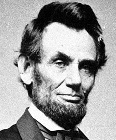
1860  Abraham Lincoln elected U.S. president Abraham Lincoln elected U.S. president
1861 John Stuart Mill formulates his principle of basing decisions on whaterver results in the greatest happiness for the greatest number of people in his book Utilitarianism, based on the ethical philosophy of Jeremy Bentham. He was also one of the earliest advocates of women's suffrage.
1861 The Gatling_gun is invented by American John Gatling.
1861-65  The American Civil War The American Civil War
1863 Emancipation Proclamation, frees all slaves in rebel states
1865 13th Amendment officially abolishes slavery in the United States.
1868 Russian revolutionary anarchist Mikhail Bakunin joined the International Workingmen's Association, leading the anarchist faction to rapidly grow in influence.
1869  First transcontinental railroad completed First transcontinental railroad completed
1869 Russian chemist Dmitri Mendeleev formulates the Periodic Law and constructs the first periodic table of elements.
|
1870s
1871 The revolutionary Paris Commune seized power for two months after the French army is defeated in the
Franco-Prussian War
1871  Otto von Bismarck masterminded the unification of Germany Otto von Bismarck masterminded the unification of Germany
1873 The British negotiate an end to the Indian Ocean slave trade in Zanzibar
1873 Scottish physicist James Clerk Maxwell publishes the textbook A Treatise on Electricity and Magnetism in which he presents his 20 equations and theory of electromagnetic radiation as well as the discoveries of his teacher Michael Faraday and other physicists.
1876  George Armstrong Custer and his 7th Cavalry massacred at Little Bighorn, Montana. George Armstrong Custer and his 7th Cavalry massacred at Little Bighorn, Montana.
1877 Thomas Edison invents the phonograph.
1876 Alexander Graham Bell patents the electrical telephone and co-founds AT&T in 1885.
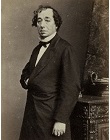
1878  Benjamin Disraeli worked at the Congress of Berlin to obtain peace in the Balkans at terms favourable to Britain and unfavourable to Russia Benjamin Disraeli worked at the Congress of Berlin to obtain peace in the Balkans at terms favourable to Britain and unfavourable to Russia
1879 Edison invents the light bulb
|
1880s
Bicycles were mass-produced beginning in the 1880s.
1880–1881 First Boer War
1881  Assassination of Tsar Alexander II of Russia. Assassination of Tsar Alexander II of Russia.
1881 President Garfield assassinated by disappointed office-seeker.
1886  Statue of Liberty dedicated in N.Y. Statue of Liberty dedicated in N.Y.
1886 Karl Benz patented first gasoline powered car

1888  Nikola Tesla licenses Alternating Current to Westinghouse Electric Nikola Tesla licenses Alternating Current to Westinghouse Electric
|
1890s
1890  Wounded Knee Massacre in South Dakota Wounded Knee Massacre in South Dakota
1893 World's Columbian Exposition in Chicago
 The Panic of 1893 set off a widespread economic depression in the U.S. until 1896 The Panic of 1893 set off a widespread economic depression in the U.S. until 1896
1896 Austrian neurologist Sigmund Freud begins using the term "psychoanalysis" to refer to his new clinical method and theories.
1896-99  Klondike Gold Rush Klondike Gold Rush

1898  Spanish–American War Spanish–American War
1898 Britain claims the Sudan in the Fashoda Crisis with Fance
1899–1902  Second Boer War Second Boer War
|